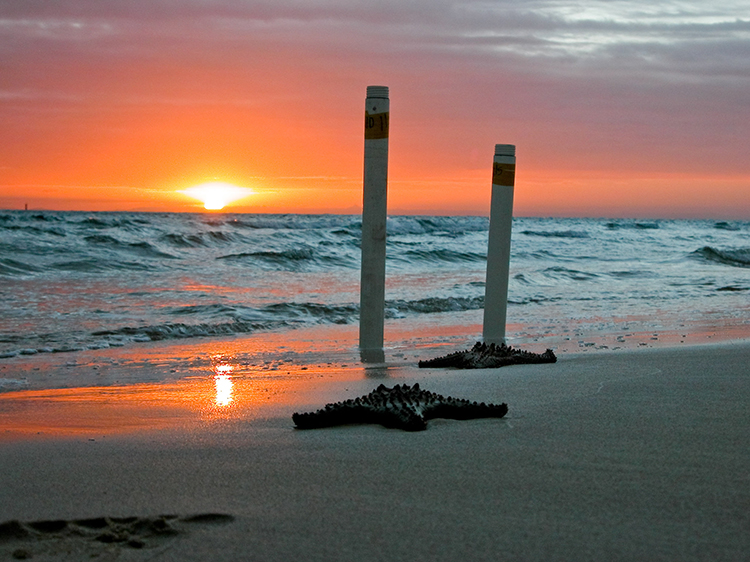A national-scale vulnerability assessment of seawater intrusion
Page last updated:9 December 2021
Project completed 2012
Background
Fresh groundwater stored in Australian coastal aquifers is an important resource for the natural environment, as well as for urban and rural residential, agricultural and industrial activities. More than 85 per cent of Australians live within 50km of the coast, and for many growing coastal communities,
groundwater is often an important water supply. The coastal groundwater resources may be vulnerable to seawater intrusion (SWI), which is the landward migration of seawater into fresh coastal aquifers. The vulnerability of Australia's coastal aquifers to SWI is not only an area of current concern but also an area of increasing future concern. The increasing demands for fresh water in coastal areas and the anticipated impacts of climate change, such as sea-level rise and variations in recharge, may result in increases in the incidence and severity of SWI.
Geoscience Australia and the National Centre for Groundwater Research and Training, in collaboration with State and Territory water agencies, undertook a national-scale assessment of the vulnerability of coastal aquifers to SWI. Project funding was provided through the Raising National Water Standards program, administered by the National Water Commission.
Instrumentation to measure physico-chemical properties in the groundwater of the upper intertidal zone
Objectives
The principal aim of the project was to undertake a national assessment of coastal groundwater resources currently vulnerable to SWI and those that may become vulnerable in the future as a consequence of over-extraction, sea-level rise and recharge-discharge variations associated with climate change.
Objectives were to provide:
- a baseline assessment of the current status and knowledge of SWI around Australia
- conceptualisations and assessments of the factors contributing to the vulnerability of Australian coastal aquifers to SWI incorporating the influences of climate change and sea-level rise
- an integrated assessment of the vulnerability of coastal aquifers in Australia to SWI.
Implementation
The project objectives were achieved through four phases:
Phase 1: Literature and data reviews provided a baseline assessment of the state of SWI investigations in Australia. This allowed the selection of 27 case study areas (CSAs) where sufficient data existed for detailed technical analyses.
Phase 2: Five technical assessments were developed to analyse factors contributing to the overall vulnerability of coastal aquifers to SWI in the CSAs.
Phase 3: The five technical assessments in Phase 2 were integrated to provide an overall SWI vulnerability assessment. The approach was applied for each CSA for both current and future conditions.
Phase 4: A national summary of SWI vulnerability was prepared. The suitability of various methods for inferring potential vulnerability to SWI in data-poor areas outside of the CSAs was also evaluated. Following this evaluation, a national assessment was made of SWI vulnerability around Australia based on the literature review, integrated vulnerability assessment and Vulnerability Factor Analysis (VFA). This allowed areas that may be vulnerable to SWI at a national-scale to be identified.
Outputs
The following reports are available:
- National-scale vulnerability assessment of seawater intrusion: summary report
- A national-scale vulnerability assessment of seawater intrusion: Literature review, data review, and method development
- A national-scale vulnerability assessment of seawater intrusion: Coastal aquifer typology
- A national-scale vulnerability assessment of seawater intrusion: First-order assessment of seawater intrusion for Australian case study sites
- A national-scale vulnerability assessment of seawater intrusion: Seawater intrusion vulnerability indexing - quantitative
- A national-scale vulnerability assessment of seawater intrusion: Vulnerability Factor Analysis
National workshop
Geoscience Australia, the National Centre for Groundwater Research and Training and CSIRO Water for a Healthy Country hosted a two-day National Coastal Groundwater Management Knowledge Transfer Workshop in Canberra on 28 and 29 May 2013.
The workshop provided a forum for government, water managers, researchers and policy makers to share knowledge from various coastal groundwater projects around Australia and identify key knowledge gaps and research priorities relating to coastal groundwater management.
